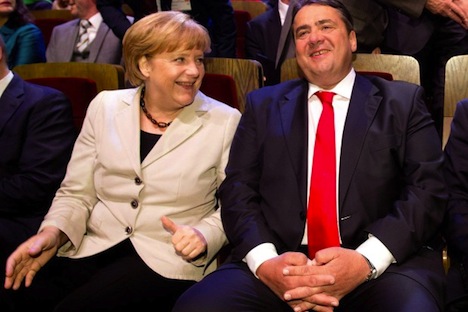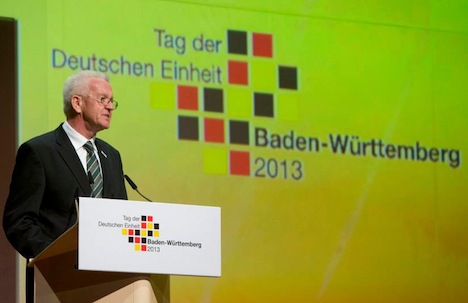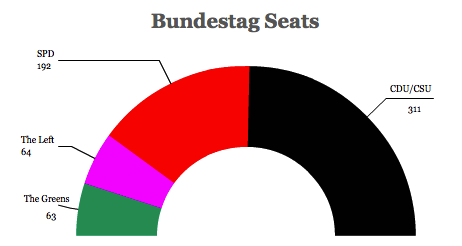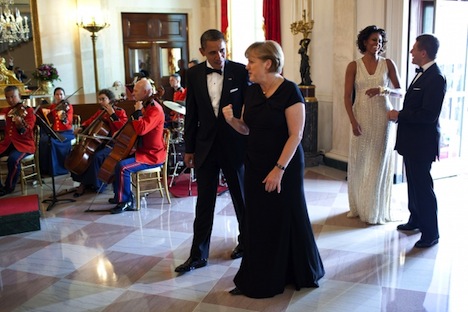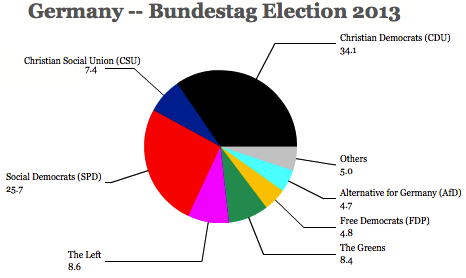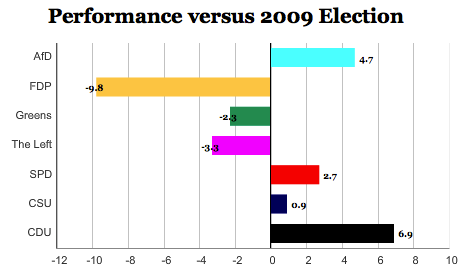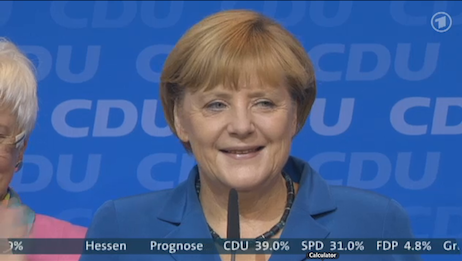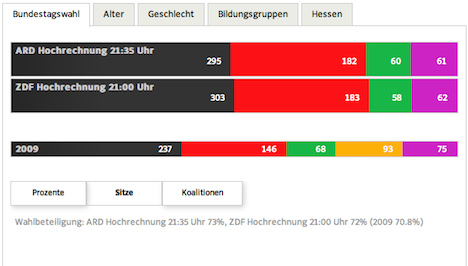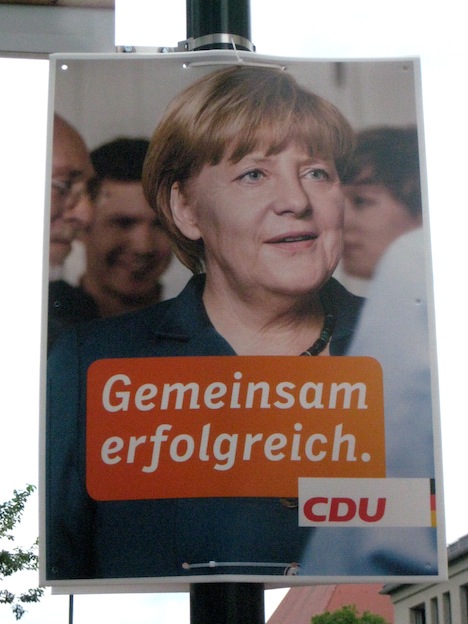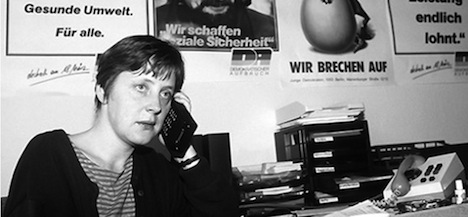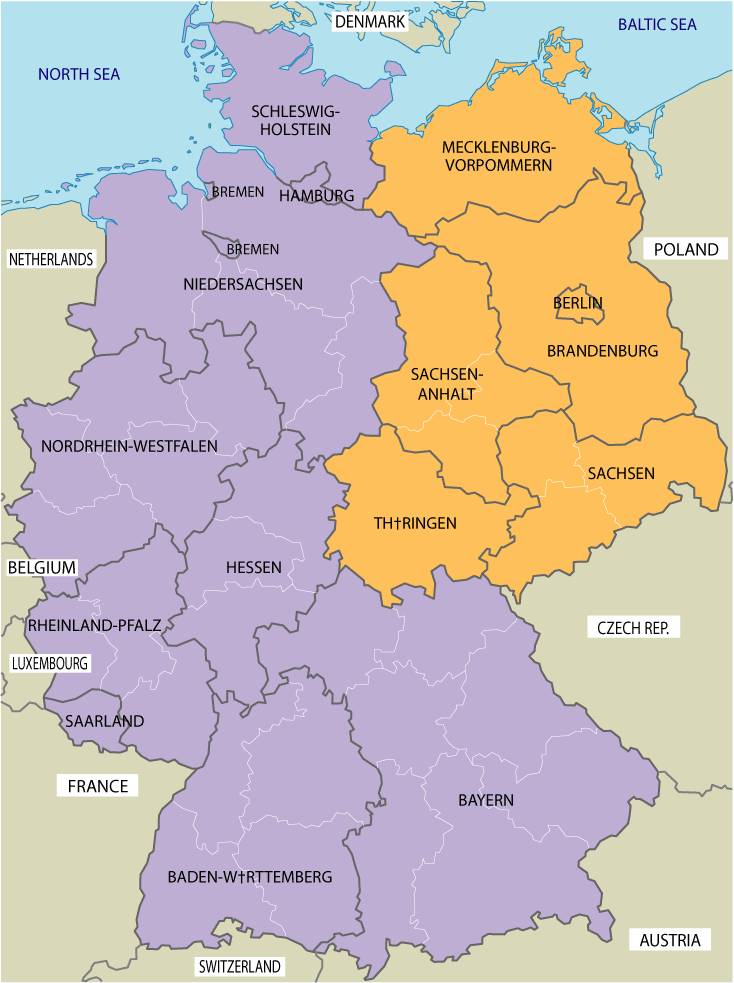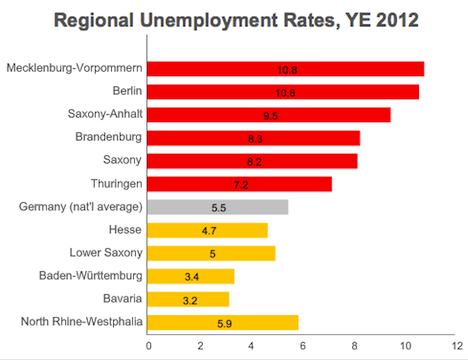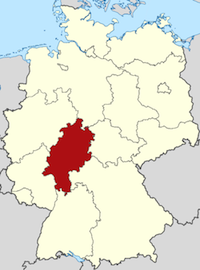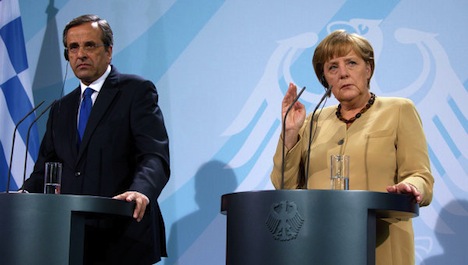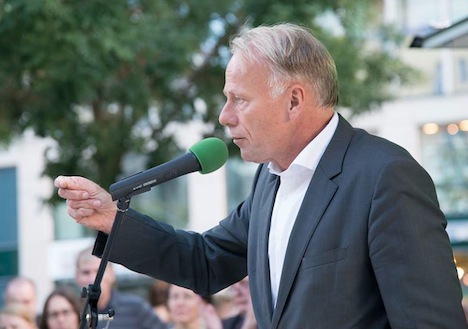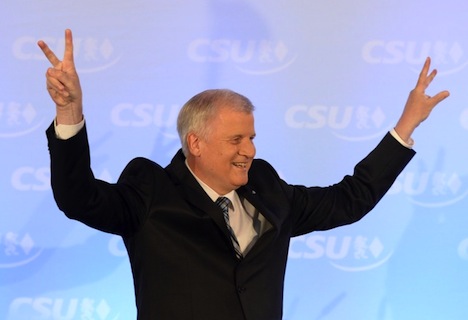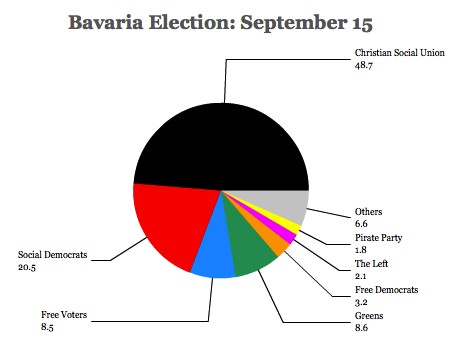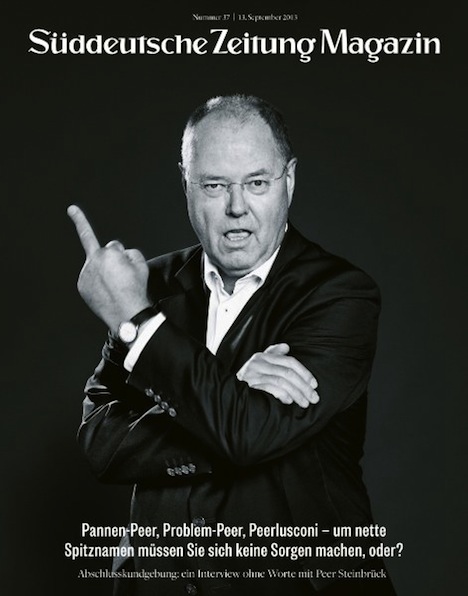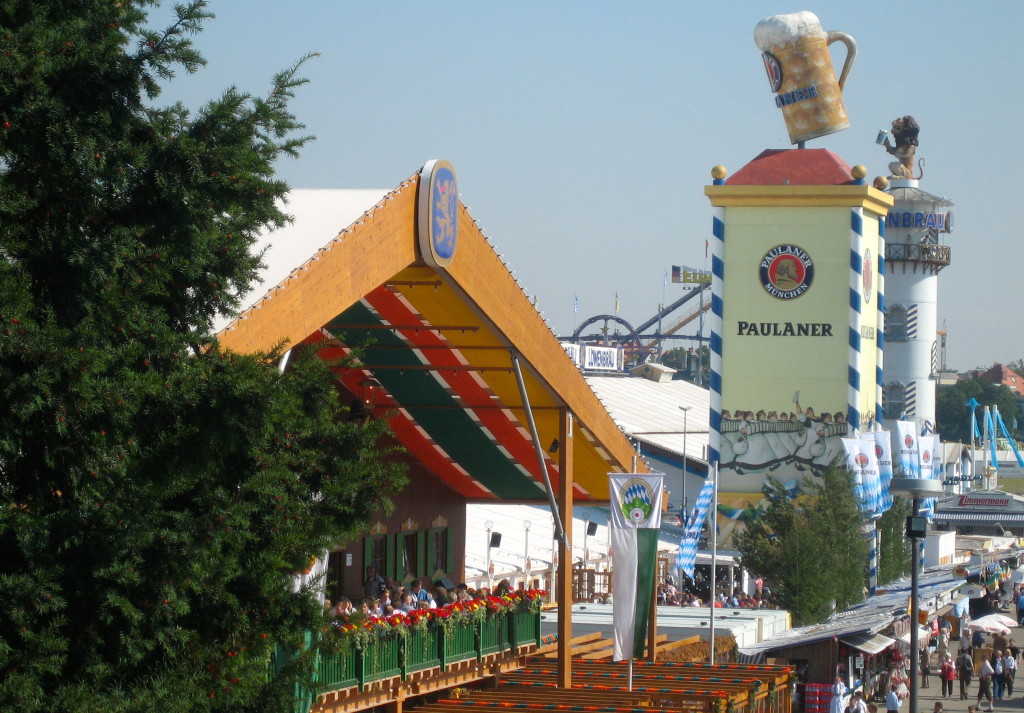
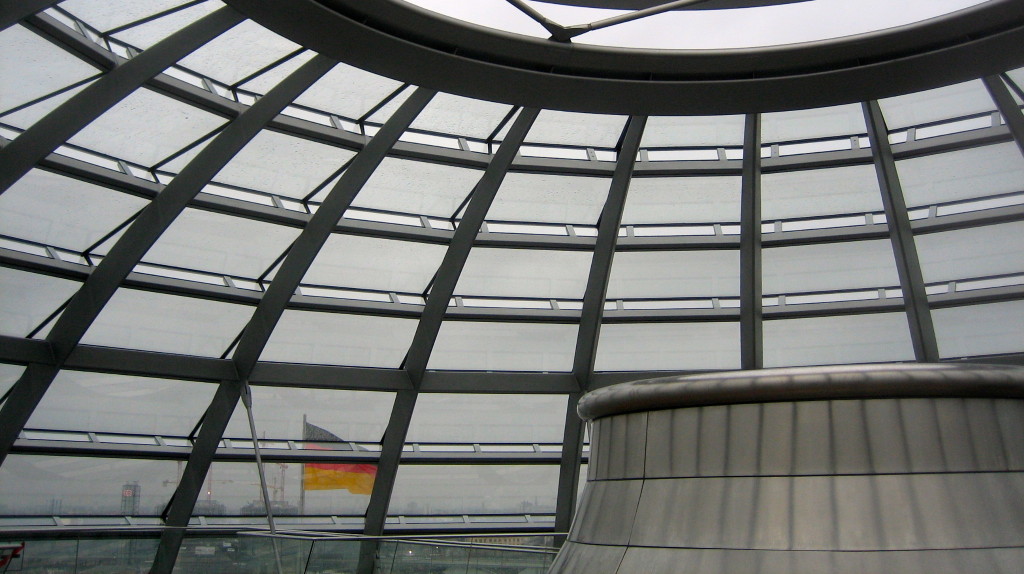
<See below Suffragio’s preview of Germany’s September 2013 Bundestag elections, followed by a real-time listing of all coverage of German politics.>
Germany, the most populous European nation-state, will vote nationwide on September 22, selecting all of the members of the Bundestag, the lower house of Germany’s parliament, which in turn elects the chancellor, Germany’s executive.
Since 2005, Germany’s chancellor has been Angela Merkel, and she widely leads the polls to return for another four-year term as chancellor, though it remains unclear whether her coalition partners will win enough seats to continue Merkel’s current center-right coalition.
Here’s a quick look at the parties:
- Christlich Demokratische Union Deutschlands (CDU, Christian Democratic Party). Germany’s primary center-right party, the CDU is the party of Merkel and of former chancellor Helmut Kohl. Polls currently show that the CDU, together with the CSU, will win between 38% and 40% of the vote, making it almost certain that the CDU/CSU will together form the largest bloc in the Bundestag. Unlike the Republican Party in the United States or the Conservative Party in the United Kingdom, however, the CDU is much less ideologically driven, a function of the relatively consensus-based approach that German’s political elites have taken to policymaking in the postwar era. Under Kohl’s 16-year reign, the CDU championed both the reunification of West and East Germany as well as the development of the European Union that we know today, including the single currency — and Kohl and the CDU had a strong hand in defining both events.
- Christlich-Soziale Union in Bayern (CSU, the Christian Social Union). In Bavaria, Germany’s second-most populous state, the CSU governs instead of the CDU for reasons that date back to the pre-war period. The CSU is more socially conservative and more focused on the relatively more conservative (and Catholic) Bavaria in particular, and the CSU has controlled Bavarian state government continuously since 1947. The CSU unites with the CDU in federal politics, and while there are policy differences between the two parties from time to time, they essentially function as a single unit for federal purposes — most recently, Bavaria’s minister president Edmund Stoiber served as the CDU/CSU candidate for chancellor in 2002.
- Freie Demokratische Partei (FDP, Free Democratic Party). Think of the FDP today as the CDU’s more sharply ideological cousin. It’s more liberal (in the classical sense) on both counts — much more economically liberal and free-market oriented and more social liberal. So it’s much more enthusiastic about cutting taxes and reducing the role of government, but it’s also more progressive on social issues, such as marriage equality (which the FDP supports and the CDU/CSU does not). Guido Westerwelle, Germany’s first openly gay party leader, led the FDP to a record-high 14.6% support in the September 2009 elections, and the FDP thereupon joined the CDU/CSU in a ‘black-yellow’ governing coalition (black for the CDU, yellow for the FDP). But the FDP’s popularity quickly slid, in part due to Westerwelle’s mixed performance as foreign minister, and he resigned as party leader in 2011. His replacement, Philipp Rösler, is Germany’s first Vietnamese-born party leader, but the party is struggling in the polls with just around 5% support, making it unclear whether Merkel will be able to build a majority with just the CDU/CSU and the FDP.
- Sozialdemokratische Partei Deutschlands (SPD, Social Democratic Party). Germany’s primary center-left party, the SPD last led the country under moderate chancellor Gerhard Schröder from 1998 to 2005. If one of Merkel’s chief accomplishments has been the phaseout of Germany’s nuclear energy (typically a goal of Germany’s political left), Schröder’s primary accomplishments included a series of labour market reforms (‘Hartz IV’) that sharply reduced social benefits for long-term unemployed (typically a goal you would associate with the political right), demonstrating just how little ideology matters to German politics. After narrowly losing the September 2005 elections, the SPD agreed to join a ‘grand coalition’ with the CDU that successfully saw Germany through the worst of the 2008-09 global financial crisis. But in the ensuing September 2009 elections, voters seems to give all of the credit to Merkel and the CDU, not to the SPD, which won its lowest vote total in the postwar era (23%). The SPD, which supports the former finance minister Peer Steinbrück for chancellor, is now mired at between 25% and 27% in the polls. Like the CDU, the SPD is very favorable to the European Union and a strongly federal Europe.
- Die Grünen (the Greens) formed in 1979 in order to purse the ‘new politics’ issues of ecological and environmental preservation, and they were long one of Germany’s leading anti-nuclear voices. They joined Schröder’s government in 1998 to form a ‘red-green coalition’ that governed the country through the next eight years, and popular Green party leader Joschka Fischer became foreign minister and a highly regarded voice on international affairs, both inside Germany and globally. Although the party still tilts to the left, there’s an increasing amount of market-based pragmatism among its younger, emerging leadership. It’s polling between 10% and 11% today, which should make it the third-largest party in the next Bundestag.
- Die Linke (the Left) is a merger between two groups, the former East Germany-based Party of Democratic Socialism (PDS) and a faction of leftist former SPD leaders who disapproved of Schröder’s moderate, reform-driven agenda in the early 2000s. The PDS emerged out of the ashes of the old communist Socialist Unity Party that dominated the Soviet-alligned German Democratic Republic (East Germany) until the fall of the Berlin Wall and the reunification of the two Germanies in 1990. Today, although the party competes nationally, its chief support comes mainly in the six states that were once party of East Germany. Its agenda is far more ideologically rigid than that of either the SPD or the Greens, and the SPD has long refused to consider forming a governing coalition with the Left.
- Alternative für Deutschland (AfD, Alternative for Germany) is a new political party founded in February 2013 as Germany’s first specifically euroscpetic party. Polls show that it could win up to 5% of the vote in the Sept. 22 elections, which would be an amazing feat for a country that’s long been among the most pro-European and pro-union within Europe.
Germany’s political system dates to the constitutional arrangement adopted by the Federal Republic of Germany (West Germany) in the aftermath of Germany’s defeat in World War II. Many elements of Germany’s Basic Law (Grundgesetz) are designed to avoid any return to the kind of Nazi extremism that dominated German politics between 1933 and 1945.
The Bundesrat, or the Federal Council, is the upper house of Germany’s parliament, but its members are unelected, instead chosen by each of the state governments. Therefore, all of the electoral action focuses on the Bundestag, which has to have at least 598 seats.
Germany has a dual electoral system — 299 members of the Bundestag are elected in single-member districts on a basic first-past-the-post standard (just like a member of the US House of Representatives or the British House of Commons). So voters will choose first a member within their electoral district — unlike in the United States, however, where incumbency is much ‘stickier’, many voters perceive this vote as a vote for the party they want to control the government (and indirectly, for chancellor) than a vote for a particular local legislator.
Another 299 members are elected pursuant to a proportional representation standard that asks voters to cast a second vote for a political party. The idea is that, notwithstanding the 299 members elected directly, party representation in the Bundestag should roughly correspond to popular voter support. So often, parties will win additional ‘overhang seats’ on the basis of the ‘party vote’ to bring their percentage of seats in the Bundestag roughly in line with their level of support on the ‘party vote.’ This often means that the Bundestag will have more than 598 members — it had 672 members between 1994 and 1998, for instance.
But the threshold for winning representation on the ‘party vote’ is 5% — that’s why the FDP and the AfD are trying furiously to win at least 5%, because the difference between 4.9% and 5.1% is the difference between winning around 1/20 of the seats in the Bundestag and winning none.
Find below all of Suffragio‘s previous coverage of German federal and state politics and the 2013 federal election campaign:
SPD party membership approves German grand coalition
December 14, 2013
Germany reaches coalition deal, faces SPD party vote
November 27, 2013
Merkel’s CDU-CSU, Gabriel’s SPD stumbling toward a not-so-grand coalition in Germany
November 20, 2013
Merkel’s coalition talks with Green Party leaders this week seem serious
October 11, 2013
That ‘transcending ideology’ thing from Obama 2008? Angela Merkel did it. Obama hasn’t.
September 25, 2013
German election results — federal Bundestag and Hesse state results (in five charts)
September 23, 2013
LIVE BLOG: Can Merkel win an absolute majority?
September 22, 2013
Germany (and Hesse) votes today!
September 22, 2013
Has the first Ossi chancellor been good or bad for the former East Germany?
September 20, 2013
Close state election in Hesse could tilt federal Bundesrat further left
September 19, 2013
Your weekend cocktail party glossary for the German election
September 19, 2013
What kind of a deal can Greece expect after the German elections?
September 17, 2013
Top German Green Party leader tagged with sensational sexual politics kerfuffle
September 16, 2013
FDP shut out of Bavarian parliament, CSU wins absolute majority
September 15, 2013
Photo of the day: Steinbrück gives Germany the bird
September 12, 2013
What is Helmut Kohl thinking by endorsing the FDP in Germany’s elections?
September 10, 2013
Green is the new black: Making the case for a Merkel-led CDU-Green coalition
September 6, 2013
Bavarian elections provide Merkel, CSU a dress rehearsal for federal German vote
September 4, 2013
Seventy years on, the politics of the Holocaust in Germany remain fraught with difficulty
August 21, 2013
Assessing the potential coalitions that might emerge after Germany’s federal elections
August 16, 2013
How Peer Steinbrück became the Bob Dole of German politics
August 5, 2013
Much ado about nothing? The non-politics of privacy in Germany
July 25, 2013
As US awaits DOMA decision, Germany’s constitutional court weighs in on gay rights
June 12, 2013
Entinhaltlichung: the best thing you’ve read so far on German politics this year
May 31, 2013
Merkel shouldn’t despair over center-right’s Lower Saxony loss
January 20, 2013
Lower Saxony state elections also a mild barometer for Merkel’s federal CDU
January 7, 2013
Thoughts on what a Steinbrück government would mean for U.S.-German relations
October 25, 2012
Steinbrück set to challenge Merkel as SPD candidate for chancellor
September 29, 2012
Wolfgang Schäuble, the ‘big beast’ of German politics, and a vital European policymaker, at age 70
September 27, 2012
Is the European ‘Christian democracy’ party model dead?
September 4, 2012
Samaras ‘negotiations’ with Berlin not going so well
August 27, 2012
Merkel tops Forbes list of top 100 powerful women
August 22, 2012
Is Bavarian finance minister Markus Söder really the most dangerous politician in Europe?
August 8, 2012
Election results: North-Rhine Westphalia
May 14, 2012
Four questions for Sunday’s North Rhine-Westphalia state elections
May 11, 2012
Three elections and three defeats for EU-wide austerity
May 6, 2012
The big news on Syria this weekend? North Rhine-Westphalia barometer of federal German politics
April 16, 2012
Photo credit to Kevin Lees: top, Munich Oktoberfest, September 2005; bottom, Berlin, December 2005.
![]()
